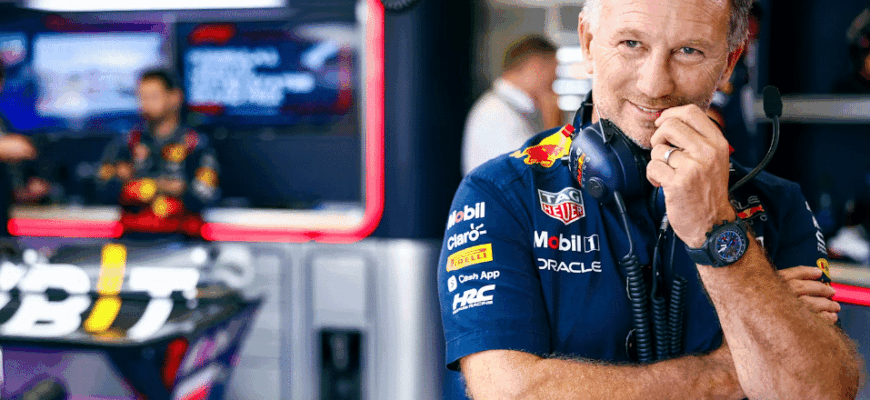An Era Defined by Dominance
For twenty years, the name Christian Horner was synonymous with Red Bull Racing. Appointed team principal in 2005, he oversaw the remarkable transformation of a nascent outfit into a championship juggernaut. Under his leadership, Red Bull captured an astounding eight Drivers` Championships and six Constructors` Championships, racking up all 124 of the team`s Grand Prix victories. From the Sebastian Vettel era to the current reign of Max Verstappen, Horner was the constant, the strategic mind, and often, the public face of a team that simply knew how to win.
His tenure wasn`t just about trophies; it was about building a culture of relentless pursuit of excellence. It was about taking risks, fostering genius (like that of Adrian Newey), and assembling a team that could consistently outperform rivals. One might even suggest he possessed a certain Midas touch, turning energy drink branding into motorsport gold.

Christian Horner became Red Bull team principal in 2005.
The Cracks in the Facade: A Brewing Storm
While Red Bull projected an image of unwavering strength and unity, especially during its periods of dominance, whispers of internal strife have long circulated. Sources within the team suggest that the atmosphere had grown increasingly tense, a situation exacerbated by a less-than-stellar performance this season and the ever-present speculation surrounding star driver Max Verstappen`s future.
The F1 paddock is a notoriously insular world, where relationships are as critical as horsepower. It appears that the intricate web of alliances and rivalries within Red Bull had begun to fray. Key figures, it is reported, engaged in a series of high-stakes meetings, including at the recent Austrian and British Grands Prix. One notable attendee was Oliver Mintzlaff, a senior corporate figure within Red Bull GmbH, who has reportedly been a long-time proponent of a leadership change within the racing division.
This internal friction wasn`t a sudden development. The passing of Red Bull co-founder Dietrich Mateschitz in 2022 left a leadership vacuum, intensifying political rifts that had previously been kept under wraps. The subsequent internal sexual misconduct investigation involving Horner, though it concluded with him retaining his role, undeniably deepened these divisions. It seems the foundations, once seemingly impregnable, were slowly eroding.
The Verstappen Variable and Shifting Sands
A crucial element in this unfolding drama is undoubtedly Max Verstappen. His unparalleled talent has been the bedrock of Red Bull`s recent success, but his future has become a topic of constant speculation. Reports of clauses in his contract linked to performance and the watchful eye of rival teams, particularly Mercedes, have added immense pressure. Furthermore, a highly publicized falling-out between Horner and Jos Verstappen, Max`s father, underscored deeper systemic issues. The Verstappen camp`s close alignment with Red Bull adviser Helmut Marko further complicated the internal power dynamics, creating a delicate balance that has now tipped.

Max Verstappen`s future at Red Bull has been an ongoing issue this season.
Another significant departure that preceded Horner`s sacking was that of legendary technical director Adrian Newey, who moved to Aston Martin. Newey`s creative genius was instrumental in designing the dominant cars that defined Red Bull`s golden eras. His exit, combined with the struggles on track and the internal discord, painted a picture of a team grappling with fundamental challenges, rather than just the usual ebb and flow of motorsport competitiveness.
The Unstoppable Current: Loss of Support
Ultimately, a leader`s tenure, even one as successful as Horner`s, hinges on the unwavering support of the ultimate authority. For Christian Horner, that lifeline was Chalerm Yoovidhya, Red Bull`s majority shareholder. Sources indicate that no decision to remove Horner could have been made without Yoovidhya`s explicit approval. The fact that this decision has now come to pass suggests a definitive shift in the shareholder`s stance, a realization that the internal turbulence had become detrimental to the overall health and future prospects of the racing enterprise.
“We would like to thank Christian Horner for his exceptional work over the last 20 years,” Oliver Mintzlaff stated, offering the customary praise that often accompanies such dramatic exits. “With his tireless commitment, experience, expertise and innovative thinking, he has been instrumental in establishing Red Bull Racing as one of the most successful and attractive teams in Formula 1. Thank you for everything, Christian, and you will forever remain an important part of our team history.”
Such statements, while respectful, cannot mask the underlying reality: the dynamic had become unsustainable. The team, which once celebrated its singular focus on winning, had seemingly become entangled in an intricate web of personal and corporate politics.
What Lies Ahead for Red Bull Racing?
In the immediate aftermath, Laurent Mekies, formerly team principal of the junior Racing Bulls team, has been promoted to CEO of Red Bull Racing, indicating a new structural approach to leadership. Alan Permane will take Mekies` previous role at Racing Bulls. This swift restructuring suggests that Red Bull was prepared for this seismic shift, perhaps even orchestrating it.
The road ahead for Red Bull Racing is now fraught with uncertainty. Will the team regain its internal harmony? How will this impact Max Verstappen`s commitment and performance? Can the new leadership navigate the treacherous waters of F1, particularly when facing resurgent rivals and the ever-present pressure of championship expectations? Only time, that most unforgiving of judges, will tell if this drastic change marks a renewed era of dominance or the beginning of a prolonged period of recalibration for the storied team.







